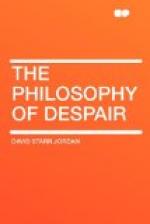In the more hopeful view of Evolution the child exists for its possibilities. The huge forces within have thrown it to the surface of time. They will push it onward to development, which may not be much in the individual case, but beyond it all lie the possibilities of its race. Inherent in it is the power to rise, to form its own environment, to stand at last superior to the blind forces by which the human will was made. With this thought is sure to come, in some degree, the certainty that the heart of the Universe is sound, that though there be so many of us in the world, each must have his place, and each at last “be somehow needful to infinity.” We can see that each least creature has its need for being. The present justifies the past. It is the transcendent future which renders the commonplace present possible.
The “dragons of the prime,
That tore each other in the slime,”
lived and fought that we their descendants may realize ourselves in “lives made beautiful and sweet,” through all unlikeness to dragons. It was necessary that every foot of soil in Europe should be crimsoned by blood, wantonly shed, to bring the relative peace and tolerance of the civilization of Europe today. It always “needs that offense must come” to bring about the better condition in which each particular offense shall be done away. For the evolution of life is not in straight lines from lower to higher things, but runs rather in wavering spirals. It is the resultant of stress and storm. The evil and failure which darken the present are necessary to the illumination of the future. Time is long. “God tosses back to man his failures” one by one, and gives him time and strength to try again.
According to Schopenhauer, we move across the stage of life stung by appetite and goaded by desire, in pain unceasing, the sole respite from pain, the instant in which desire is lost in satisfaction. To do away with desire is to destroy pain, but it also destroys existence. Desire is lost where the “mouth is stopped with dust,” and with death only comes relief from pain.
Thus the Pessimist tells us that “the only reality in life is pain.” But surely this is not the truth. He who knows no reality save appetite has never known life at all. The realities in life are love and action; not desire, but the exercise of our appointed functions.
Action follows sensation. The more we have to do the more accurate must be our sensations, the greater the hold environment has upon us. Broader activities demand better knowledge of our surroundings. Greater sensitiveness to external things means greater capacity for pain, hence greater suffering, when the natural channels of effort are closed. Thus arises the hope for nothingness in which many sensitive souls have indulged. With no surroundings at all, or with environment that never varies, there could be no sense-perception. To see nothing, to feel nothing — there could be no demand for action.




